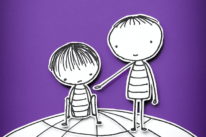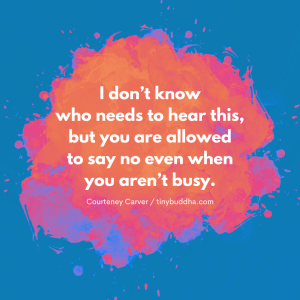
“Have a heart that never hardens, and a temper that never tires, and a touch that never hurts.” ~Charles Dickens
All of us have been hurt or angered by someone’s words at some point. Some words are blatantly cruel, and others are deceptive, appearing to be in our best interest but only ever leading us astray. These are the messages that leave us questioning who we are or how we should be.
I’ve been labeled timid and stuck-up. Speak up more, but stop interrupting. Be more assertive, but don’t complain. Be more outgoing, but be authentic.
I’ve been called careless and a lousy role model and then questioned about why I am such a perfectionist. Lighten up. Don’t apologize so much.
And my all-time favorite: your voice is off-putting and might scare the children.
These are painful messages, and historically I’ve taken them to heart.
When we’ve been hurt, we might try to get rid of the feelings by distancing ourselves or fighting back. It can be hard to regard these feelings as reflecting our desire for connection.
We also try our hand at shapeshifting, becoming who we think we ought to be. This approach to connection can actually backfire. While we could feel more connected in the short term, we’ve also reinforced the message that who we are isn’t enough. Any guesses about what that does to us over time?
Lashing out, hiding away, or conforming do not bring us any closer to connection nor do they leave us feeling validated or loved.
For me, this is a big lesson in loving-kindness. Loving-kindness is a sense of benevolent affection, unwavering connection, and compassion for ourselves and others, even the difficult people in our lives.
This lesson has taken a while and is admittedly still a work in progress, but it is powerful nonetheless.
Loving-kindness does not leave us immune to negative emotions, but it is most potent when called upon in our less than loving or kind moments. Loving-kindness also does not leave us impervious to hurtful messages, though it can lessen their impact.
When we are hurting or angry, loving-kindness can be especially challenging. It is therefore empowering to practice loving-kindness not simply in spite of feeling hurt but because we have been hurt.
Finding loving-kindness relies on three things: our ability to love and be loved, maintaining our composure, and acting with good will.
Have a heart that never hardens.
Loving-kindness involves wishing peace, joy, and tenderness for others. It means celebrating successes, easing suffering, and cultivating feelings of friendliness and affection.
We cannot do this with a hardened heart.
A hardened heart is closed or blocked off. It may expect the worst or interpret hostile intent. A hardened heart is surrounded by not merely a wall but by a fortress of steal.
With a heart that never hardens, there is ample room for warmth, forgiveness, patience, and compassion. Having a heart that never hardens also reflects our ability to love and be loved.
Yes, being loved is actually an ability. Let me be clear. By ability to be loved, I don’t mean lovability or worthiness of love. I mean being able to allow others to love you.
We make decisions about vulnerability, trust, and love when we’ve been hurt. We protect against vulnerability or we try again, decide that people are or are not to be trusted, and either open ourselves up to or block ourselves off from love.
The key to having a heart that never hardens is to remember that your heart is strengthened, not scarred, by heartache. When words sting, know that this pain reveals an open heart.
Trust in yourself to be able to handle it if and when you are hurt. Treat yourself with compassion in life’s painful moments, and take a healthy risk on vulnerability even when you’ve been hurt in the past. Allow yourself to be at peace when you are hurting or angry, and cultivate benevolence and goodwill rather than stewing in bitterness or breeding ill-will.
Have a temper that never tires.
Composure is another major component of loving-kindness. We all vary in our natural ability to keep a level head in the face of pain or anger.
Anger is normal and natural, and it is even helpful when understood. Anger lets us know when something is amiss. It alerts us to threat or injustice.
In truth, you will probably get ruffled from time to time. That’s just part of being human. However, this does not mean that you need to lose your temper.
When we lose our tempers, we say and do things that we don’t mean. We can lash out, blame, and deny. This usually leads us to do anything but communicate.
Acting without thinking often makes a bad situation worse. Not only do we still have the triggering event to contend with, but we now have the fallout from whatever we said or did when we lost our temper. It can become difficult to resolve the situation, and rather than cultivating peace, we create a crisis.
Losing our temper doesn’t just harm those around us but also ourselves. We can experience regret and shame after losing our temper, and we ruminate about it later and work ourselves up further.
Loving-kindness allows us to recognize our anger and breathe warmth and peace into it. It gives us a bit of extra reaction time and reminds us of our connection to this person pushing our buttons.
To have a temper that never tires, know your triggers. Common triggers for anger are feeling threatened or vulnerable, having our goals blocked, and feeling mistreated.
Also pay attention to the times when you are more susceptible to losing your temper. It may be when you are feeling overworked, overtired, and underfed, or you may be under the pressure of high expectations or demands.
To keep your temper, knowledge is power, and knowledge plus acceptance is even more powerful. Acceptance doesn’t mean agreement, simply acknowledgement. Acceptance that it is what it is can go a long way toward defusing your anger and redirecting that energy toward positive action or loving-kindness.
Have a touch that never hurts.
Acting with tenderness and good will is the third component of loving-kindness. You can’t have a touch that never hurts if you have a hardened heart or a quick temper.
A harmful touch can have two main functions: getting rid of pain and inflicting pain.
Quite often, anger is secondary to pain. Somehow it seems easier to be angry than to be hurting. When we’re angry, we can place blame on someone other than ourselves and act out accordingly.
When we are hurting, we can also turn our anger inward. We can inflict pain on ourselves in a variety of ways and for a variety of reasons.
In contrast to this, loving-kindness is benevolent and gentle. It is approaching others with sympathy and care and using your touch to heal and comfort yourself and others.
Having a touch that never hurts refers to both physical and emotional harm. Certainly, our hands can be used as weapons, but so can our words and our actions.
When you are hurting, resist the temptation to hurt someone back through name-calling, gossip, or blame. Put revenge aside and focus on moving forward.
Use your touch for healing, not hurting. Reach out to hold the hand of someone you care about. Scratch their back, give a massage, or high five. Extend a loving gesture toward yourself by putting your hands over your heart and simply breathing.
Using your hands to build or create can also help you cultivate loving-kindness. Try writing a caring note to a friend, pitching in through volunteering, or simply creating something for your own enjoyment.
Hand heart image via Shutterstock
About Leslie Ralph
Leslie is a psychologist, writer, and artist on a mission to make the world a brighter place. She creates things for people who want to bring the light back into their lives and love themselves unconditionally. She’s the author of How to Have Your Back: Simple Instructions for Loving Yourself Through the Ups and Downs of Life. Download her free ritual for releasing and receiving to let go and create space for more clarity, courage, and compassion in your life.













 Though I run this site, it is not mine. It's ours. It's not about me. It's about us. Your stories and your wisdom are just as meaningful as mine.
Though I run this site, it is not mine. It's ours. It's not about me. It's about us. Your stories and your wisdom are just as meaningful as mine. 